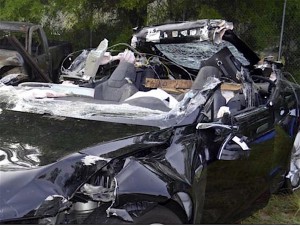
Tesla CEO Elon Musk said that the media is complicit in the 1.2 million global traffic deaths each year because it writes stories about autonomous vehicle crashes.
Critics of self-driving cars may be “killing people” by building consumer resistance to the technology, said Tesla Motors CEO Elon Musk.
Proponents of autonomous vehicles – including not only Musk but also U.S. Transportation Secretary Anthony Foxx – contend the technology could eventually result in the elimination of most, perhaps all, highway deaths. But early prototypes, as well as vehicles equipped with semi-autonomous systems, have been involved in a number of crashes, including a May 9 accident in Florida in a Tesla Model S that resulted in the death of a former Navy SEAL.
Nonetheless, the South African-born Tesla founder, said that reporting on such events is counterproductive because when, “you write an article that effectively dissuades people from using an autonomous car, you’re killing people.”
Musk made his comment during a Wednesday evening media call following the announcement that Tesla would launch an all-new, fully autonomous vehicle control system replacing the current semi-autonomous Autopilot.
(For more on the Tesla autonomous vehicle announcement, Click Here.)
That less capable technology has taken a number of hits in recent months following word of the May crash. Several other incidents, including a fatal accident in China, have been linked to Autopilot, but it is yet unclear if the technology was to blame there, as well.

Musk said that stories about fatal crashes in autonomous vehicles discourages adoption of the technology.
Two government agencies, the National Highway Traffic Safety Administration, and the National Transportation Safety Board, have launched investigations of the Tesla system. The automaker has pledged to cooperate, but Tesla officials have, on occasions, been critical of the coverage, a position Musk ramped up on Wednesday.
He said it was “disturbing” that there has been so much attention to a handful of crashes involving vehicles using various levels of autonomous technology – including more than a dozen incidents reported by tech giant Google. Musk suggested that the media are ignoring the fact that “1.2 million people … die every year in manual crashes.”
In fact, this publication, like most, frequently writes about the heavy toll of highway crashes. A recent article on TheDetroitBureau.com noted that motoring fatalities rose about 8% last year, reversing a decade-long decline, and examined the reasons why.
(For more on that story, Click Here.)
Coverage of individual accidents is a staple of local newspapers and broadcast news outlets, as well. The fact is that more people die each week in the U.S. due to motor vehicle accidents than would be lost in a weekly crash of a fully loaded airbus A380 jumbo jet, something that routinely touches just about every community in America.
And that is a key reason why advocates like Foxx, NHTSA Administrator Mark Rosekind and Tesla’s Musk are pressing for the adoption of autonomous technology. Most automakers, and key automotive suppliers, are already working on such systems, with a number of makers expecting to have at least their initial, self-driving vehicles in production by the beginning of the next decade.
But Transportation Sec. Foxx has also stressed, on a number of occasions, the need to place safety first during the early development phases. The nation’s top auto safety regulator in July said, “We want people who start a trip to finish it.” During a speech in San Francisco, Foxx added that, while “Autonomous doesn’t mean perfect … we need industry to take the safety aspects of this very seriously.”
Recent studies have shown that the public does have a mixed, and often conflicting, view of autonomous vehicle technology. But during the last several years, as awareness has grown, the overall view has become increasingly more favorable, especially among younger, more tech-savvy motorists.
A month ago, the federal government issued the first national guidelines for autonomous vehicles. Several states have written rules of their own. Those regulations are expected to evolve over the next few years, according to Foxx. And observers say one key question will concern liability.
Asked whether Tesla could be held accountable for any crashes involving its self-driving vehicles, Musk said: “If you view autonomous cars like an elevator in a building, does Otis take responsibility for all elevators around the world? No it doesn’t. What really matters here at the end of the day,” said Musk, is ‘what is the absolute safety.’”
(Tesla warns of slow Model 3 deliveries. For more, Click Here.)
That’s actually one of many questions that will have to be answered before large numbers of autonomous vehicles take to the highways in the U.S. and other parts of the world.
